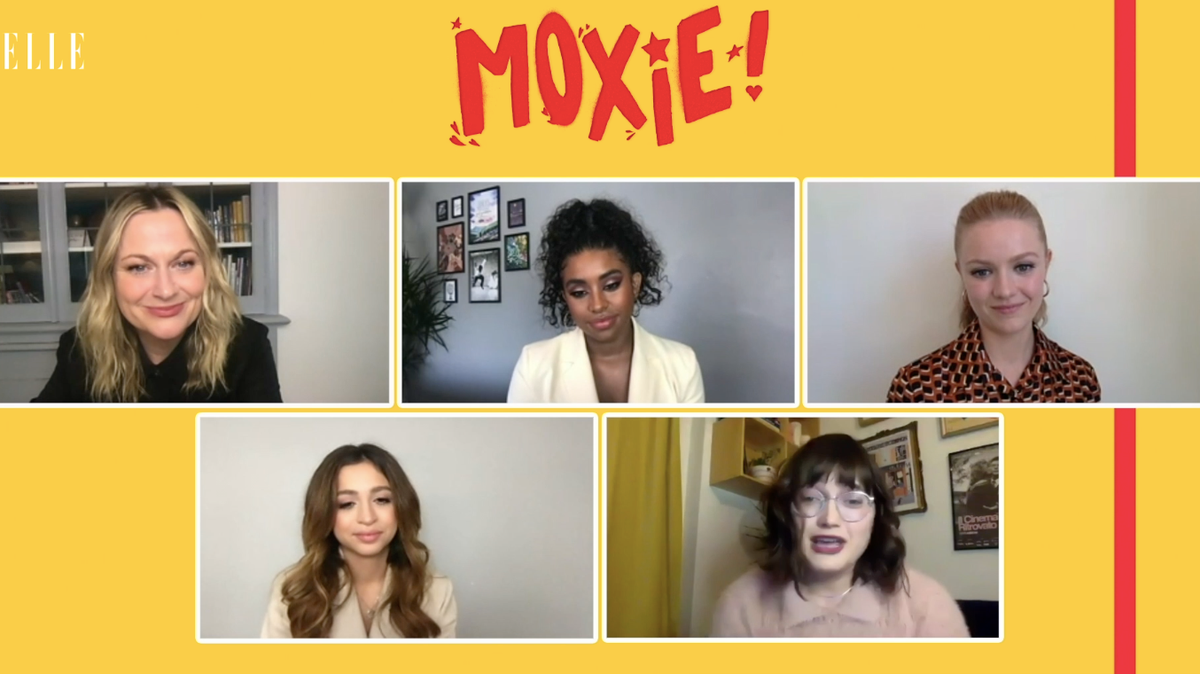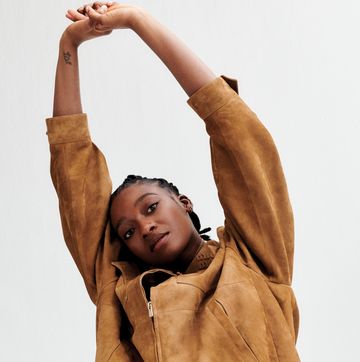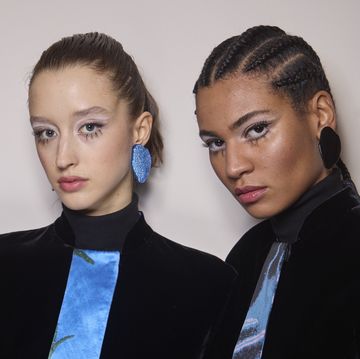‘It was supposed to be a “fun” mixer, introducing the new graduates who had started work at my fintech company to their colleagues and managers. This was in May 2020, so it was planned to take place on Zoom,’ says Leanne*, 52, the company’s chief financial officer. The ill-fated party was her idea. ‘I thought, “It’s such a crappy time to start in a new job with working from home, let’s try and have a laugh together.”
I suggested we do a Mexican night, margaritas and tacos, sending a DIY kit out to everyone. My PA made up a flyer, with a picture of me in a sombrero holding a margarita. Next thing I know, the CEO says there have been complaints from one of the new starters, and it blows up into this big thing where the 24-year-olds are saying it’s cultural appropriation, with the rest of us like, We just wanted a bloody cocktail!’
This incident, and ones like it, are being replicated in workplaces around the world right now. Throw twenty-somethings embarking on their first jobs – digital natives, driven by authenticity, activism and self-confidence – together with a middle-age-and-older workforce who are potentially still only halfway through their careers, tired but hanging on in there, having survived redundancies, parental leave and all manner of previously unregulated discrimination, and sparks are bound to fly.
But what may have once amounted to some awkward moments at the office Christmas party has, over the past few years, escalated into a warfare that is dismantling workplace dynamics, resulting in the exodus of many prominent figures and shattering industries.
As a millennial (I’m 38), I’ve sometimes felt like the long-suffering middle child in organisations. I’ve been a manager in progressive organisations where I found myself increasingly frustrated that junior members of staff needed endless validation. While in some of the more traditional, male-dominated places I’ve worked – such as a big, old-school advertising agency – I’ve been the difficult one, calling out the lack of diversity and insisting language on official documents is changed to be more inclusive of LGBTQ+ people. But my experiences years ago are nothing compared to the polarisation playing out in offices, even virtual ones, today.
There has always been friction between generations; think of the fight of young people in the Sixties for sexual liberation, pitted against their uptight parents and grandparents who had fought in World Wars. The line between their lived experiences caused a cultural revolution. Now those freewheeling kids of the Sixties and Seventies are today’s grandparents. You might think that they’d have more in common with firebrand Gen Z than they did with their own elders. Instead, a chasm of misunderstanding and disagreement is driving a wedge even further between them.
The rise of Gen Z has caused resentment and jealousy among those considerably older than them, who thought themselves open-minded and liberal – until their unconscious biases and privilege were called into question by ‘woke’ twenty-somethings, reluctant to listen to their line of argument.
The #MeToo movement was the first to rile intergenerational relationships, with older women antagonised by the need for younger women to speak out about experiences of sexual harassment or assault. But the issues polarising staff now run the gamut of identity politics, activism, authenticity, safetyism and freedom of speech. With ‘right’ and ‘wrong’ experienced differently by everyone, HR departments are finding themselves ill-equipped to deal with the realities of a modern intergenerational workforce. Add a pandemic into the mix, and it’s no surprise one HR director I spoke to recently quit her job and moved abroad to retrain as a yoga instructor. ‘Life is just too short for that stress’, she says. ‘I was asked to mediate conflicts so complex I didn’t understand them. We had processes and policies but none that covered these kinds of grey areas. It was a minefield.’
Jane Merrimen is a 38-year-old commissioner at a TV production company. She’s mixed race and, during the Black Lives Matter protests last summer, found herself advocating for her company’s Black, Asian and Minority Ethnic (BAME) network, comprising mainly junior members of staff in their twenties and early thirties, while also supporting her colleagues on the leadership team who were coming under fire.
‘What became clear was that, fundamentally, the difference between people my age and Gen Z is that we tend to believe in freedom of speech, giving people a voice and that all sides of the argument are valid. Whereas our Gen Z colleagues want to feel “safe”,’ she says.
This idea of emotional ‘safety’ is a controversial one. It’s deemed by more conservative factions as symptomatic of unnecessary fragility among a generation of ‘snowflakes’, while those who use it to support the experiences of marginalised groups claim it is a vital human right that protects them from bullying and harassment.
In The Coddling of the American Mind: How Good Intentions and Bad Ideas Are Setting Up a Generation for Failure, Greg Lukianoff writes: ‘A culture that allows the concept of “safety” to creep so far that it equates emotional discomfort with physical danger is a culture that encourages people to systematically protect one another from the very experiences embedded in daily life that they need to become strong and healthy.’
‘During the most heightened moments in the Black Lives Matter movement, there was an issue around commissioning a TV show that was deemed problematic,’ says Merrimen. 'There were huge arguments internally, over whether this piece, which was conceived by a Black person, was racist or not because it addressed racism.’
In Zoom calls with the BAME network, Merrimen says she was made to feel that, because she’s black, she should be on their side. But she believed in the piece of work, and in the genuine attempts that senior staff were making to address their industry’s general lack of diversity.
‘Over the past 10 years I’ve seen people making an effort,’ Merrimen says wearily. ‘I’ve seen the goodwill of staff in all parts of my organisation encouraging change and calling for inclusion. Then you have people coming into the business who are 20, wanting things to happen faster. Sadly, I witnessed some senior leaders lose their job over this when they could have been allies.’
During recent conflict at The New York Times, 1,000 staffers signed a letter protesting against editorial page editor James Bennet’s decision to publish a controversial column by a Republican senator. Bennet resigned, shortly followed by colleague Bari Weiss, who said she felt freedom of speech was being quashed by a leadership more interested in not upsetting people than speaking the truth. Writers and speakers with challenging views were being ‘cancelled’. She wrote in her resignation letter that ‘as the ethics and mores of [Twitter] have become those of the paper, the paper itself has increasingly become a kind of performance space'.
Chloe Combi, author of Gen Z: Their Voices, Their Lives identifies one of the major issues dividing generations and causing insurmountable arguments is older people dismissing the heightened feelings and reactions of younger people as disingenuous or ‘performative’. From her extensive research, Combi believes Gen Z’s commitment to things such as ‘language purity’ – there being a single right way to talk about a person or experience – is ‘absolutely genuine’.
But 36-year-old writer Weiss, like many others, takes issue with the idea that language can be ‘policed’ at all. She claimed that there was a ‘civil war’ in The New York Times offices between the liberal ‘old guard’ and ‘the new guard’ (younger staff members) who had a different worldview. She tweeted: ‘They call it “safetyism”, in which the right of people to feel emotionally and psychologically safe trumps what were previously considered core liberal values, like free speech.’
Leanne (who caused controversy by suggesting a Mexican-themed night) says: ‘I’ve always thought of myself as open-minded. I work with lots of young people and I’ve never had a problem before. I’ve been a mentor and made great friends. But something has changed. We’ve hired a number of very – how can I put it? – politically engaged graduates.’
What also hasn’t helped this divisiveness among generations in the workplace is that older people such as Leanne have become memes in Gen-Z workplace culture. They are ‘Karen’ or ‘Suze’, bearing the brunt of internet humour that paints them as out-of-touch Boomers with little to offer. Leanne’s latest bugbear is being asked to put her pronouns in her email signature. ‘I don’t mind how anyone identifies. But why should I have to write "Leanne (she/her)" on emails I send just because some 20-year-old says so?
‘I often say to the young people I work with, “Don’t hurt the importance of your message by getting angry at people for using a term you find offensive,”’ says Combi. ‘With older people who are trying, it can undermine their contribution.’
For 27-year-old Rachel Jones, the older people she worked with weren’t trying at all to meet her in a place of mutual respect. She took an administrative job at a funeral directors earlier this year and witnessed, alongside the literal death of an older generation, the decay of a business threatened by her youth, gender and talent. ‘My bosses – a 79-year-old man and his 40-year-old son-in-law – were very unbothered by political correctness. They are both Black. I’m mixed race and they were very keen to tell me about their experiences of being Black in Britain, which are entirely different to my own in so many ways.
During one such conversation in the staff room, I said I’ve never really experienced racism, especially not to my face. My boss said, “No Rachel, what you have to understand is that everyone just sees you as a n*****.” And I was like, “What?! No! You can’t just say that!” I stuck very strongly to my point and as he raised his voice, I raised mine. He was saying, “You’re wrong. You have experienced racism, you are what you are,” and I just continued to say, “But I really haven’t”. It was difficult, particularly because there are huge expectations that the young respect their elders in Caribbean culture.’
Jones is gay and, outside of work, moves in a circle of liberal creatives who, she tells me, are motivated by freedom – either working a nine-to-five to make regular money that then allows them a freedom in their personal lives, or who work for themselves so they can feel free professionally. She tells me that, to an extent, she could be her authentic self at work, ‘But there was a line I knew I could not cross.’
It was eventually crossing this line that meant she quit, choosing to be out of work rather than spend another day with her Boomer employers. ‘I got annoyed with my manager and said, “This is why I don’t like men!” He lost his sh*t. Then I got lectured for three hours on why I shouldn’t have said that, in a condescending way, because I’m “a young woman who doesn’t understand”. I handed in my resignation that afternoon.’
It’s unlikely that anyone now in their forties would have had the chutzpah to respond to a boss in such a way when they were Jones’ age, no matter how hard they were pushed. And perhaps a lot of this generation’s disconnection with younger people now comes from an indignation that they suffered and tolerated a lot more than youth today are willing to.
Younger generations’ willingness to speak out is rooted in the self-esteem movement in the classrooms of the mid-Eighties and Nineties. This idea of ‘being yourself’ was something I was lucky enough to experience as a Xennial (those on the Gen X/millennial cusp), and it has meant that my peers and I were gifted a self-assuredness that those older than us weren’t taught in the same way. People like Jones, a decade younger, benefited even more from this schoolroom shift in focus to self-esteem.
The fault lines we are seeing in workplaces from funeral directors to massive media conglomerates are the same ones fracturing society. And the cracks are widening, thanks to a dangerous inability to even listen to perspectives different to one’s own. Joe Twyman, co-founder of the public opinion consultancy Deltapoll, provides some context:
‘In the UK we have an older generation, which generally feels that the social changes of the past 20 or 30 years happened against their wishes and without their consent. Brexit was a symptom of this. On social media, there’s a belief that everyone should be like “me”,’ says Twyman. ‘There is a lack of understanding and acceptance of others’ views, because there’s a tendency in our on-demand world to choose the news and opinions we want, and cut out everything else.’
Twyman is right. Even those of us who detest the term have inadvertently curated our own ‘safe spaces’ in every aspect of our lives. We surround ourselves with friends, popular culture and social media that reflects a version of ourselves back at us. I remember visiting the London outpost of women-only members’ club The Wing last year and feeling as if I was trapped, quite literally, inside an Instagram-filtered echo chamber where we could avoid the poor, ugly or uncreative. Interestingly, even such a shrine to stylish pseudo-wokeness was not immune to the clashes we are seeing in tech, media and white-collar industries. Recently staff at the now-closed clubs have spoken of mistreatment and discrimination and Audrey Gelman, its high-profile founder, has resigned.
Women-only spaces are not exempt from generational discord, and neither are tight communities such as the LGBTQ+ factions within a workplace. Todd Sears, CEO of Out Leadership, a ‘global LGBT+ business network’, says that having four generations in the workplace creates a fascinating dynamic, particularly in the LGBTQ+ community. ‘You’ll notice that there are very few gay male baby boomers in business – that’s because of the Aids crisis in the Eighties. Late Gen X had to do the fighting for the rights we have now. When they started working, being gay was a psychological disorder. Younger generations have no idea what that was like.
‘Millennials came into work in an era of Will & Grace. They could be out without having to think about it and, for many older people, that was thanks to the battles they fought. Now Gen Z’s of working age, coming into offices wanting to expand the letters in LGBT, which creates challenges to our allies, gay and straight. You almost need a PhD in gay these days to speak about it. There are 43 different gender identities, and many people over 35 feel getting on board with them is well above their pay grade. Younger generations expect everyone to get it straight away, rather than go on the journey.’
When I refer to myself as ‘queer’ during our conversation, Sears points out this is an intergenerational difference that could potentially cause conflict if we worked together. He, a gay man a decade older than me, associates it with playground bullying and homophobia. It’s a pejorative term for him. For my friends and me, it’s entirely different.
‘The conflict can be averted with a simple conversation: “I use the word queer, but you don’t, tell me about that.” Rather than saying, “Your experience must mirror this, or you’re cancelled,”’ he explains.
Combi says, ‘Gen Z are not interested in being flexible. If people don’t conform to the same purity of language, there might be an assumption that person is racist or transphobic or woman-hating, causing unbelievable tension at work.’
Another option for avoiding intergenerational workplace conflict altogether is to take the lead from San Francisco-based cryptocurrency exchange Coin Base, which offered employees a generous severance package – four to six months of salary – if they weren’t comfortable with a new policy discouraging most forms of political advocacy. The move came after a summer when many tech companies faced pressure from employees to become more outspoken on issues of social justice.
‘While I think these efforts are well-intentioned, they have the potential to destroy a lot of value at most companies, by being a distraction and creating internal division’, says founder and CEO Brian Armstrong.
Personally, I have left the politics of the office behind. After the experience of being on staff at an organisation during the height of the pandemic, and the move to working from home, I realised that so much was lost without everyday in-person interaction, and minor misunderstandings could be blown out of proportion. I felt tired of worrying about what I was saying and how it might be interpreted by people with different priorities to my own – video calling seemed to make connecting with people of different ages and experiences even harder. So, when I was made redundant, I took it as an opportunity to set up shop for myself and, professionally, I’ve never been happier.
For Rachel, quitting a job due to generational differences with her bosses taught her to stick up for herself a bit more and be outspoken: ‘It was more of a life lesson than a career lesson. It encouraged me to find my voice.’
The responsibility to solve generational warfare at work seems to lie somewhere between individual leaders, who must lean in to conflict and create spaces for open and honest conversation, the Gen Xers who can help guide Gen Z to achieving their goals in a way that doesn’t shut down conversation, and in the very simple, selfless act of listening on all sides. For progress we need pressure, but we also need patience. Only organisations that find this sweet spot, and build a truly open and diverse workforce that plays to each generations’ strengths, will be successful and wield the most power in a future that looks anything but certain.
This article appears in the February 2021 issue of ELLE UK.
Like this article? Sign up to our newsletter to get more articles like this delivered straight to your inbox.
In need of more inspiration, thoughtful journalism and at-home beauty tips? Subscribe to ELLE's print magazine today! SUBSCRIBE HERE




















